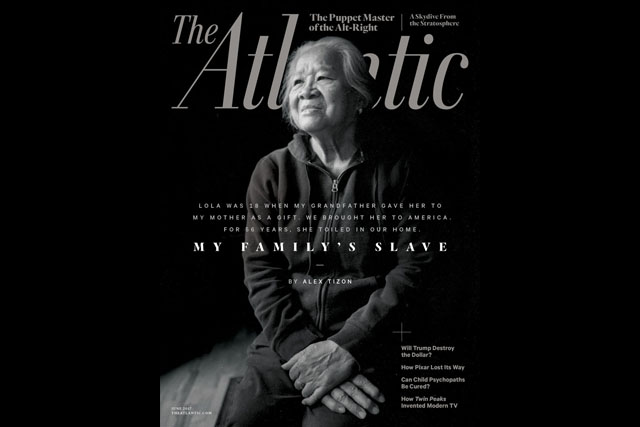‘Lola’ obituary writer sorry for failing to share slavery story

The magazine cover of The Atlantic's June 2017 issue with the controversial cover story "My Family's Slave." Photo from The Atlantic
MANILA, Philippines — The writer of Eudocia “Lola” Tomas Pulido’s obituary has reacted to a former colleague’s article for the Atlantic, “My Family’s Slave.”
Seattle Times staff reporter Susan Kelleher wrote another article to apologize for her obituary on published 2011 after she read former colleague and Pullitzer-winning journalist Alex Tizon’s posthumously published piece.
In the Seattle Times’ article “Why the obituary for Eudocia Tomas Pulido didn’t tell the story of her life in slavery,” Kelleher explained that she only wrote of Lola’s extraordinary life of devotion to family but failed to mention that she was living in modern slavery because she was unaware of it.
Regretful over Lola's obituary
Regretful Kelleher recalled that she was assigned to write the obituary and was able to interview Tizon about Pulido’s life. However, she said, her former colleague never mentioned slavery in his account.
The obituary writer said she was horrified and angered when she read Tizon’s account of Pulido’s life because she felt she was unable to give justice to her in her obituary.
“Many of the details were familiar, as Tizon had shared them with me during a long interview following the death of a woman he knew as 'Lola,' an honorific title in her native Tagalog that Tizon took to mean grandmother. In retrospect, the obituary reads as a whitewash for a fundamental truth known only to Tizon and his family: Ms. Pulido was a slave,” Kelleher wrote.
“Even typing those words makes me sick, as does knowing, as I do now, that I wrote about slavery as a love story,” she added.
Tizon's piece, which is featured in the magazine's June 2017 issue, has been shared across social media and has sparked discussions on the treatment of domestic helpers and on the existence of slavery in modern times.
In Tizon’s article, it was revealed that he only realized that Pulido was his family’s slave when he was 11 years old. Pulido was "given" to his mother as a helper before Tizon's parents moved to the US. She lived with members of the Tizon family for 56 years without receiving any pay.
She passed away at the age of 86.
The Seattle Times said it is “shocked at the newly revealed disparity in Tizon’s accounts of her life.”
'Tizon lied'
Meanwhile, despite the revelation, Kelleher said she does not mean to malign Tizon, whom she described as “revered as a writer and a truth teller.”
“It is not my intention to denigrate him, only to apologize for being complicit in further injuring Ms. Pulido by providing cover for what was ultimately a life denied,” Kelleher said.
“As a reporter, Tizon knew that writing the final story of someone’s life is an honor and a huge responsibility, one that relies on people in grief to tell the story,” she continued.
“Obituaries depend on the fundamental honesty of the people who survive to tell the story. Tizon lied to me, and through me, to our readers, depriving Ms. Pulido of the truth of her life, and the rest of us an important piece of our history. And for that I am truly sorry,” Kelleher concluded.
Tizon died at the age of 57 in March. His wife, Melissa, said he struggled writing Pulido’s story and was probable not ready to tell the truth yet when he spoke with Kelleher.
- Latest
- Trending
































